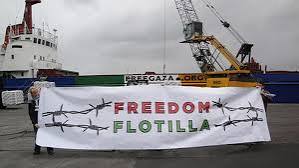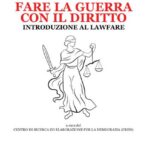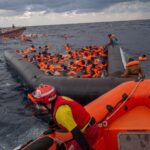Il Centro di ricerca ed elaborazione per la democrazia (CRED) sostiene la seguente lettera (testo originale inglese e nostra traduzione italiana) al governo turco, sottoscritta da vari giuristi, che chiede di consentire la partenza della Freedom Flotilla (nave di coscienza) destinata a portare soccorso umanitario alla popolazione di Gaza.
To
His Excellency Mr. Recep Tayyip Erdoğan, President of Republic of Türkiye;
His Excellency Mr. Hakan Fidan, Minister of Foreign Affairs, Republic of Türkiye; and
His Excellency Mr. Abdulkadir Uraloğlu, Minister of Transport and Infrastructure, Republic of Türkiye.
International Lawyers’ and Legal Groups’ Urgent Request for Immediate Clearance for the Ship Conscience to Sail and Notice of Potential Damages
Dear Excellencies,
We, the undersigned lawyers and advocates from across the world, write to you with great urgency and profound concern regarding the continued detention of the Ship Conscience at Turkiye’s Haydarpaşa port. As advocates for international law and human rights, we call on Your Honorable Offices to allow the Ship Conscience to depart in compliance with Turkish and international laws immediately.
Legal Compliance by the Conscience
Ship
The Ship Conscience and its owners have fully complied with all legal regulations and requirements under both Turkish and international law. Most notably, they have subjected themselves to numerous inspections, abided by all restrictions, regulations, and requirements, submitted confirmation of same along with all required paperwork, and have complied with all Turkish and international laws. The Ship was subject to numerous unusual hurdles and obstacles and has met all challenges. Despite this, they have patiently, and until now quietly, withstood numerous delays and resulting exorbitant financial costs and have even expressed their willingness to waive any claims against relevant Turkish ministries—though they have no obligation to do so. As such, there is no legal or political basis for the delay or prohibition of its departure.
Each day of delay is a sizable added expense, which may ultimately sink the Ship’s efforts altogether. As such, the delay, added expense, and adverse impact on the ship and its endeavours are not losses that could be borne by them alone but would lay grounds for actionable liability.
Moreover, the continued refusal to permit the ship’s departure contradicts the principles enshrined in several international legal provisions and principles, including the United Nations Convention on the Law of the Sea (UNCLOS), which guarantees the freedom of navigation. As a state party to the International Covenant on Civil and Political Rights (ICCPR), Turkiye has an obligation to ensure that civil society entities are not unduly hindered, burdened, or impeded in peaceful and humanitarian missions, particularly those aligned with international legal orders such as the International Court of Justice’s (ICJ) Preliminary Orders in South Africa v. Israel and the recent ICJ Advisory Opinion on the Legality of Israeli Occupation. Both these ICJ findings underscore the responsibility of all states to undertake action to stop unlawful Israeli practices, including the siege and blockade of Gaza, as specifically articulated by the ICJ.
Avoiding Reputational and Legal Liability
The ship owners, managers and Freedom Flotilla Coalition are not asking Turkiye to take action but rather asking Turkiye to stop obstructing their own, independent , fully lawful, and peaceful action – and to stop denying their basic Turkish civil rights— so they can fulfill this international duty for which they have expended hundreds of thousands of dollars.
The continued obstruction and delay of the Conscience ship from sailing and carrying out its mission may be seen as an unlawful act of confinement-obstruction and in breach of Turkiye’s obligations under international law.
This would also place Turkiye in the position of undermining its global standing as a supporter of law, justice, and support to the Palestinians facing genocide in Gaza. Allowing the Ship Conscience to sail would affirm Turkiye’s commitment to these principles and to the peaceful resolution of conflicts. Blocking the ship, however, risks sending a message that undermines these commitments and aligns Turkiye with those who seek to obstruct international efforts to address grave injustices. Acting swiftly to allow the Ship Conscience to sail would prevent any legal and reputational damage to Turkiye and reaffirm its unwavering commitment to justice, morality, human rights, and the rule of law.
We await your positive response to this letter and are prepared to offer any services or guidance that may facilitate the swift issuance of permission for the Ship Conscience to depart.
Respectfully Yours,
Lamis J. Deek, Director of Legal and Diplomatic Affairs, PAL Law Commission, Legal Counsel for Freedom Flotilla Coalition, New York Bar.
Enes Kafadar, President of Worldwide Lawyers Association (WOLAS), Istanbul Bar Association.
Dan Kovalik, PAL Law Commission.
Hüseyin Dişli, Legal Counsel for Freedom Flotilla Coalition, WOLAS, Antalya Bar Association.
Dr. Shahd Hammouri, University of Kent, Law School.
Professor Maria Aristodemou, Birkbeck, University of London.
Professor Mohamed Badar, Northumbria Law School.
Professor Abdelwaheb Matar, The University of Tunis, former Minister of Training and Employment in Tunisia.
Dr Jasmin Johurun Nessa, Liverpool Law School.
Toby Cadman, Guernica 37 Barrister Chambers, UK.
Suzanne Adely, President of National Lawyers Guild.
Dr Hasan Basri Bülbül, Boğaziçi University, Istanbul.
Dr Andrea Maria Pelliconi, University of Southampton.
Leena Widdi, PAL Law Commission.
Bayram Veli Yuvalı, WOLAS, Istanbul Bar Association.
Wafaa Ayman Mohsen, Palestinian Bar Association.
Julia Sulaiman A. Karem Talaa, Palestinian Bar Association.
Enas Mohammed Hasheem Al-Aklook, Palestinian Bar Association.
Yara Ibrahim Alaasar, Palestinian Bar Association.
Sondos Hatem Taimah, Palestinian Bar Association.
Aya Khaked Al Talla, Palestinian Bar Association.
Nour Nahed Halmey Salout, Palestinian Bar Association.
Samar Khalid Sabry Ahmed, Palestinian Bar Association.
Linda Saleh Al Dina, Palestinian Bar Association.
Diana Saleh Al Dina, Palestinian Bar Association.
Lina Haitham Shaban Diab, Palestinian Bar Association.
Ayşe Kalkan, Istanbul Bar Association.
Hasan Ece, Istanbul Bar Association.
Ahmet Atakul, Istanbul Bar Association.
Mehmet Yalçın, Yalova Bar Association.
Feyzullah Çiftçi, WOLAS, Istanbul Bar Association.
Soraya Fatima Paulina Jacob Nunez, Chilean Bar Association.
Enes Kiraz, Istanbul Bar Association.
Wesam Ahmad, Al-Haq Center for Applied International Law, Palestine.
Pablo Andrés Araya Zacarías, Chilean Bar Association.
Najet Hadriche, Tunisian Bar Association.
Salah Abdel Atti, President of the International Commission to Support Palestinian People’s Rights (ICSPR).
Enrico Calamai, Mani Rosse Antirazziste, Italy.
Prakriti, Indians for Palestine, India.
Maria Antonietta Pascali, National Research Council of Italy.
Nadeem Khan, India Palestine Friendship Forum.
Amira Abdelhamid, University of Portsmouth.
Osayd Awawda, Palestinian Bar Association.
Azril Mohd Amin, Centhra Malaysia.
Naazim Adam, Palestine Solidarity Alliance of South Africa.
Romil Shamsudin, Perdana Global Peace Foundation
Marvic Camilleri, Gustizzja Ghall-Palestina.
Tasha Qhairunnisa, Security Industry Development Corporation.
Lima Bustami, Palestinian Bar Association.
Daniel R. Taylor, NSW Solicitor, Australia (Co-private prosecutor with Uncle Robbie Thorpe in Melbourne Magistrate’s Court against Mark Regev on charges of advocating genocide).
Fabio Marcelli, Copresident, Center for Research and Elaboration on Democracy (CRED), Velletri Bar, Italy.
Kimberly Redigan, Michigan Coalition for Human Rights; Meta Peace Team; Pax Christi Michigan.
Luna Deça Moreira, UNFPA.
Marie Christine Bonduki, Federal Criminal Lawyers.
Carlos Marun, Former MP, Brazilian Bar Association.
Dr Paulina Barrera Rosales, Institute for Legal Research- UNAM.
Pietro Ameglio, SERPAJ– Servicio Paz y Justicia.
Muhammed Halit Yürük, Istanbul Bar Association.
Fazlurrahman Üsame Sarıyaşar, Istanbul Bar Association.
M. Sena Eliküçük, Istanbul Bar Association.
Şeyma Zorlu, Istanbul Bar Association.
Efsun Nur Tavukcu, Istanbul Bar Association.
İsmail Davulcu, Istanbul Bar Association.
Eyüp Ensar Avci, Istanbul Bar Association.
Hasan Veli Şirin, Istanbul Bar Association.
Abdulkadir Tok, Istanbul Bar Association.
Mustafa Eminoğlu, Quds and Law Association.
Beyza Çağlar, Sakarya Bar Association.
Ümmühan Bedihağaoğlu, Ağrı Bar Association.
Dr. Muhammet Celal Kul, Istanbul Bar Association.
Professor Hector Ortiz Elizondo, El Foro Latinoamericano de Antropología del Derecho.
Professor Maria Fernanda Arámbula, Universidad Anáhuac del Norte, Mexico.
Dr Natalie Brinham, University of Bristol.
Mariam Jamal Esmail Abdullah, Palestinian Bar Association.
Sami Mohammed Ismail Alghoul, Palestinian Bar Association.
Nemaa Hemdan Selmy Abu Behary, Palestinian Bar Association.
Sadi M. S. Attallha, Palestinian Bar Association.
Heyam M. R. Hajjaj, Palestinian Bar Association.
Ayat Mohamed Mahmoud Al-Shaer, Palestinian Bar Association
Gentili Eccellenze,
Noi, i sottoscritti avvocati e avvocati di tutto il mondo, vi scriviamo con grande urgenza e profonda preoccupazione riguardo al persistente trattenimento della nave di coscienza nel porto turco di Haydarpaşa. In qualità di difensori del diritto internazionale e dei diritti umani, chiediamo ai Vostri Onorevoli Uffici di consentire alla nave di coscienza di partire immediatamente in conformità con le leggi turche e internazionali.
Conformità al diritto da parte della nave di coscienza
La nave di coscienza e i suoi proprietari hanno pienamente rispettato tutte le norme e i requisiti legali previsti dal diritto turco e internazionale. In particolare, si sono sottoposti a numerose ispezioni, hanno rispettato tutte le restrizioni, i regolamenti e i requisiti, e ne hanno confermato la sussistenza insieme a tutti i documenti richiesti e hanno rispettato tutte le leggi turche e internazionali. La nave è stata soggetta a numerosi ostacoli, a volte di natura insolita, e ha superato tutte le sfide. Hanno pazientemente, e fino ad ora silenziosamente, resistito a numerosi ritardi e ai conseguenti costi finanziari esorbitanti e hanno persino espresso la loro volontà di rinunciare a qualsiasi pretesa nei confronti dei ministeri turchi competenti, sebbene non abbiano alcun obbligo di farlo. Pertanto, non vi è alcuna base giuridica o politica per il ritardo o il divieto della sua partenza.
Ogni giorno di ritardo comporta considerevoli spese aggiuntive, che potrebbero determinare alla fine l’annullamento degli sforzi fin qui prodotti. Il ritardo, le spese aggiuntive e l’impatto negativo sulla nave e sui suoi sforzi potrebbero costituire la base per azioni legali di responsabilità.
Inoltre, il continuo rifiuto di consentire la partenza della nave contraddice i principi sanciti da diverse disposizioni e principi giuridici internazionali, tra cui la Convenzione delle Nazioni Unite sul diritto del mare (UNCLOS), che garantisce la libertà di navigazione. In qualità di Stato parte del Patto internazionale relativo ai diritti civili e politici (ICCPR), la Turchia ha l’obbligo di garantire che le entità della società civile non siano indebitamente ostacolate, gravate o ostacolate nelle missioni pacifiche e umanitarie, in particolare quelle in conformità all’ordinamento giuridico internazionale, chiarito dalle ordinanze preliminari della Corte internazionale di giustizia (ICJ) in Sudafrica v. Israele e dal recente parere consultivo della Corte Internazionale di Giustizia sulla legalità dell’occupazione israeliana. Entrambe queste decisioni della Corte Internazionale di Giustizia sottolineano l’obbligo di tutti gli Stati di intraprendere azioni per fermare le pratiche illegali israeliane, tra cui l’assedio e il blocco di Gaza.
Evitare la responsabilità reputazionale e legale
Gli armatori, i manager e la Freedom Flotilla Coalition non chiedono alla Turchia di agire, ma piuttosto di smettere di ostacolare la loro azione indipendente, pienamente legale e pacifica – e di smettere di negare i loro diritti civili turchi fondamentali – in modo da poter adempiere a questo dovere internazionale per il quale hanno speso centinaia di migliaia di dollari.
Il continuo ostruzionismo e il ritardo della nave di coscienza nel salpare e svolgere la sua missione possono essere considerati alla stregua di atto illegale di confinamento-ostruzione e in violazione degli obblighi della Turchia ai sensi del diritto internazionale.
Ciò minerebbe la posizione globale della Turchia come sostenitrice del diritto, della giustizia e dei diritti dei Palestinesi che affrontano il genocidio a Gaza. Permettere alla nave di coscienza di salpare affermerebbe l’impegno della Turchia nei confronti di questi principi e della risoluzione pacifica dei conflitti. Bloccare la nave, al contrario, rischia di costituire un messaggio contraddittorio con questi impegni e di porre la Turchia nel novero di coloro che cercano di ostacolare gli sforzi internazionali per affrontare le gravi ingiustizie.
Agire rapidamente per consentire alla nave di coscienza di salpare eviterebbe qualsiasi danno legale e reputazionale alla Turchia e riaffermerebbe il suo incrollabile impegno per la giustizia, la moralità, i diritti umani e lo Stato di diritto.
Attendiamo la vostra risposta positiva a questa lettera e siamo pronti a offrire qualsiasi collaborazione che possa facilitare il rapido rilascio del permesso alla partenza della nave di coscienza.

Segue elenco firmatari



